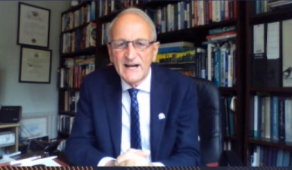HFMA summer conference: NHS needs new Wanless review
Sir Chris (pictured), former chief executive of the King’s Fund, is currently chair of the Coventry and Warwickshire Integrated Care System and a non-executive director of Royal Free Hospitals NHS Foundation Trust. He said the Wanless report had offered a bold analysis of what the NHS needed in 2002 and this was acted on by the Labour government of the day. ‘We need a new Wanless, in my view,’ he said.
He added that the challenging underlying financial position of the NHS had been masked by the extra cash given by the government to meet the costs of the Covid pandemic. But this cash is time limited.
‘We still don’t know for H2 [the second half of 2021/22] how much money the NHS will have to continue on the recovery programme or to deal with the ongoing Covid challenges,’ he said. ‘We do know for sure that the cost of recovery will be massive and we will need a multi-year and generous funding settlement for the NHS, which in my view will need to exceed the historic long-term average annual increases of about 4% a year in real terms.’ In 2002, on the back of the Wanless recommendations, the government announced 7.4% annual real terms increases for the following five years.
Sir Chris recognised that any increased funding would need to be found at a time when there were many other legitimate claims on scarce public finances including those from education and social care.
‘My worry is I’m not sure the government at the moment recognises how serious the position is within the NHS,’ he said. ‘There are huge operational pressures in every part of the service at the moment. And we have staff who are working their socks off having been through hell and high water in the last 15 months or so.’
He said more honesty was needed in facing up to these challenges and recognising the time and resources that will be needed to build the service back from its current position.
He added that this year’s spending review would be a major watershed’, calling on NHS leaders to play their part by making an evidence-based case for what the NHS needs.
However, he reminded the conference that the Wanless estimates had been based on a scenario of ‘full engagement’, where the population would reduce its over-reliance and over-dependence on organised health services. This shared responsibility for improving health and wellbeing remained vital in addressing today’s challenges. ‘The demand side has been ignored for far too long,’ he said.
Sir Chris also offered a number of lessons the NHS could take from its experience during Covid-19. Much of the good work by healthcare workers during the pandemic had involved staff making decisions quickly, drawing on their professional skills to do the right things for patients rather than acting on central instructions. Once the NHS has put the pandemic behind it, it needed to provide support and space for frontline teams, reducing the burden of regulatory and reporting requirements.
The mutual support that was evident between organisations and systems also needed to be maintained post-pandemic. And he stressed that place-based partnerships – not just the 42 higher level ICSs – would be key to taking this forward.
Finally, he said the successful national plan/local execution approach to the vaccination programme should be applied to other services across the country to address persistent unwarranted variations in the care delivered.
Related content
We are excited to bring you a fun packed Eastern Branch Conference in 2025 over three days.
This event is for those that will benefit from an overview of costing in the NHS or those new to costing and will cover why we cost and the processes.